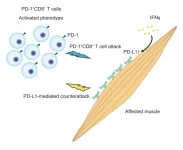(Press-News.org) Immunotherapy in combination with chemotherapy has become an important therapeutic treatment option in some patients with metastatic breast cancer. Which patients will benefit the most, however, remains unclear; current biomarkers such as PD-L1 that are used to predict response are mediocre at best. Vanderbilt researchers led a clinical trial combining atezolizumab, an immunotherapy, in combination with chemotherapy in patients with metastatic triple-negative breast cancer to both evaluate the efficacy of the treatment combination and to understand biomarkers of response to immunotherapy.
Atezolizumab became the first approved immunotherapy for breast cancer when the Food and Drug Administration granted it accelerated approval in 2019, but two years later, its maker voluntarily withdrew the indication after additional data from a follow-up clinical trial failed to corroborate its efficacy. Atezolizumab had been approved for metastatic PD-L1-positive triple-negative breast cancer in combination with the chemotherapy nab-paclitaxel. Results from Vanderbilt’s clinical trial, published Dec. 14 in JAMA Oncology, indicate that this immunotherapy does have a clinically meaningful benefit with a different chemotherapy partner and the correlative analyses provide insight to which patients will respond.
The clinical trial combined atezolizumab with carboplatin — a chemotherapy that works differently than nab-paclitaxel. The new combination significantly improved progression-free and overall survival of patients with metastatic triple-negative breast cancer. Atezolizumab with carboplatin lengthened progression-free survival — the time a patient lives without the cancer worsening — from a median of 2.2 months to 4.1 months. Overall survival increased from a median of 8.6 months for the control group, who received carboplatin alone, to 12.6 months for those who received the combination therapy.
The phase 2 randomized clinical trial was conducted at six cancer centers through the Translational Breast Cancer Research Consortium and involved 106 patients of diverse ethnicities.
“Triple-negative breast cancer is difficult to treat because we don’t have a clear target, and understanding the underlying factors that affect response to a treatment is key. This study is so important because we were able to collect biopsies in all of the participants and really understand factors that affect response,” said Vandana Abramson, MD, the Donna S. Hall Professor in Cancer Research and co-leader of the Breast Cancer Research Program at Vanderbilt-Ingram Cancer Center.
The researchers hypothesized that atezolizumab would have better efficacy with carboplatin because the chemotherapy is a platinum agent, which causes structural DNA changes and generates neoantigens that may stimulate an immune response. Nab-paclitaxel chemotherapy works differently. It is a microtubule-stabilizing agent that stops cancer cells from dividing into new cells.
“The tremendous knowledge gained from our multidisciplinary analyses of the patients and their tumors will continue to be important for clinical decision-making. After our first description of the triple-negative breast cancer subtypes over 10 years ago, more recently, we refined the subtypes further into four, which were analyzed in this study: two basal-like subtypes, a mesenchymal subtype and a lumen androgen receptor-expressing subtype. When we refined the triple-negative breast cancer subtypes, we revealed an immune-modulatory descriptor or correlation. This JAMA Oncology study and others continue to confirm that lymphocytes, as measured by the immune-modulatory correlation, have predictive value for better relapse-free survival for triple-negative patients. Further, this study provides evidence that the luminal androgen receptor subtype is more like estrogen receptor-positive (or ER+) disease. Prior studies investigating immunotherapy in breast cancers have shown that patients with ER+ disease have less benefit from immunotherapy, and we found that to be the case with patients with luminal androgen-positive tumors in this trial,” said Jennifer Pietenpol, PhD, Chief Scientific and Strategy Officer and Executive Vice President for Research at Vanderbilt University Medical Center, the study’s corresponding author.
Interestingly, patients with higher body mass indexes and uncontrolled blood glucose levels had greater benefit from atezolizumab with carboplatin. The researchers noted that these patients may have more immune cells upon which anti-PD1/PD-L1 therapies can act. A lower risk of disease progression was also associated with high mutation burden and increased tumor-infiltrating lymphocytes.
“In this study, we observed that patients received benefit with atezolizumab even if the tumors were PD-L1 negative. We also show that, like prior clinical trials in melanoma and renal and lung cancers, tumors with high mutation burdens and the presence of immune cells within or around the tumor receive greater benefit from immunotherapy. This makes sense because each mutation has the potential to be recognized as non-self by the immune system, increasing the probability of immune cells already positioned around the tumor to recognize and target the cancer. One surprising finding was the trend toward greater benefit for patients with higher body mass indexes and patients with uncontrolled blood glucose at prediabetic and diabetic levels while on the study. Both obesity and diabetes are linked to systemic inflammation, and the increased benefit may be attributed to higher adipose tissue composition in the breast and augmented by metabolic syndrome conditions such as Type 2 diabetes. Further studies are necessary to validate these findings and delineate the effects of blood glucose and obesity on immunotherapy,” said Brian Lehmann, PhD, Research Associate Professor of Medicine and lead correlative scientist on the study.
The combination therapy was generally well-tolerated, and toxic effects were consistent with previous reports for atezolizumab. The most common drug complications on the combination arm of the clinical trial were low blood platelet counts, anemia, lymphocytopenia, nausea, fatigue and increased liver enzymes. The participants identified as 69% white, 19% African American, 10% unknown and 1% Asian.
“It is important to highlight that these discoveries would not have been possible without the contributions of breast cancer patients and their willingness to contribute their time and numerous biospecimens to this study. These patients spanned a network of collaborative cancer centers within the Translational Breast Cancer Research Consortium and partnered with oncologists, pathologists, radiologists, basic and translational scientists and biostatisticians to complete this trial. We are so grateful to the patients and their families,” said Pietenpol, Ingram Professor of Cancer Research and holder of the Brock Family Directorship in Career Development.
The study’s lead authors are Brian Lehmann, PhD, and Vandana Abramson, MD. Other Vanderbilt authors on the study are Paula Gonzalez-Ericsson, MD, Melinda Sanders, MD, Kimberly Newsom, Richard Abramson, MD, Quanhu Sheng, PhD, Chih-Yuan Hsu, PhD, Yu Shyr, PhD, and Hanbing An, PhD.
The researchers received support from the National Cancer Institute (CA098131), Susan G. Komen, Genentech, and the Translational Breast Cancer Research Consortium.
END
Clinical trial shows efficacy for atezolizumab combined with carboplatin
2023-12-14
ELSE PRESS RELEASES FROM THIS DATE:
Egocentric coding unveiled: researchers unlock brain's spatial perception mechanisms
2023-12-14
Researchers from the Shenzhen Institute of Advanced Technology (SIAT) of the Chinese Academy of Sciences (CAS) and their collaborators have uncovered the coding principle underlying self-centered (egocentric) representation in spatial perception. The study was published in Neuron on Dec. 14.
Our understanding of the intricate spatial perception mechanisms in the human brain has recently advanced with the discovery that self-centered perception of external items is closely integrated with our world-centered understanding of the world, which is the brain's internal "GPS" system. Given ...
AI study reveals individuality of tongue’s surface
2023-12-14
Artificial Intelligence (AI) and 3D images of the human tongue have revealed that the surface of our tongues are unique to each of us, new findings suggest.
The results offer an unprecedented insight into the biological make-up of our tongue’s surface and how our sense of taste and touch differ from person to person.
The research has huge potential for discovering individual food preferences, developing healthy food alternatives and early diagnosis of oral cancers in the future, experts say.
The human tongue is a highly sophisticated and ...
Finding the source of debilitating, body-wide muscular pain and weakness
2023-12-14
Researchers from Tokyo Medical and Dental University (TMDU) identify the T cells that, when activated, are pathogenic in a subset of idiopathic inflammatory myopathies
Tokyo, Japan – Inflammation is an important part of the body’s defenses, eliminating threats and repairing damage. When the immune system is overactivated, though, it can turn from friend to foe. Now, researchers from Japan have identified the culprit responsible for one type of harmful inflammation that occurs in certain muscular disorders.
In a study published last month in the Journal of Autoimmunity, ...
Jacob Tsimerman receives Ostrowski Prize in Higher Mathematics
2023-12-14
The Canadian mathematician Jacob Tsimerman has been awarded the International Ostrowski Prize in Higher Mathematics 2023. The Ostrowski Prize is worth 100,000 Swiss Francs and named after Alexander M. Ostrowski, a professor of mathematics who taught at the University of Basel.
Jacob Tsimerman, a professor of mathematics at the University of Toronto (Canada), received the Ostrowski Prize 2023 in recognition of his work at the interface of transcendence theory, analytic number theory and arithmetic geometry, including recent breakthroughs on the André-Oort and Griffiths conjectures.
Shimura varieties are algebraic varieties of great ...
This next generation blue light could potentially promote or hinder sleep on command
2023-12-14
Blue light from LED lamps and consumer electronics can mess with your sleep because it disrupts production of the natural sleep hormone melatonin. Tinted glasses or displays in night mode can mask, but don’t remove, a portion of the disruptive wavelengths. But now, researchers report in ACS Omega that they have designed more “human-centric” LEDs that could potentially enhance drowsiness or alertness on command.
Humans have evolved over millennia to be active during the day and to rest at night; we’ve depended on the sun to regulate our sleep/wake cycle. But many people ...
New app to bridge information gap between hospitals and nursing homes; better care for patients
2023-12-14
INDIANAPOLIS – Approximately one in five older adults in the U.S. is transferred to a nursing home following a hospital stay. For many of these patients, an accessible medical record does not accompany them, often negatively affecting the care they receive at the nursing home. This poor information sharing is a significant problem contributing to the adverse events within 45 days of hospital discharge experienced by nearly 40 percent of nursing home residents.
Regenstrief Institute research scientists Kathleen Unroe, M.D., MHA, and Joshua Vest, PhD, ...
Timothy Rhoads of the University of Wisconsin Madison receives the AFAR 2023 Sagol Network GerOmic Award for Junior Faculty
2023-12-14
NEW YORK — The American Federation for Aging Research (AFAR) is pleased to announce recipient of the 2023 Sagol Network GerOmic Award for Junior Faculty: Timothy Rhoads, PhD, Assistant Professor, University of Wisconsin-Madison. Established in 2020, the Sagol Network GerOmic Award for Junior Faculty is a one- to two-year award given to junior faculty (MDs and PhDs) to conduct aging-related Omics (GerOmics) research.
Omics is a rapidly evolving, multi-disciplinary, and emerging field that encompasses genomics, epigenomics, transcriptomics, proteomics, and metabolomics. Each of these fields offers ...
American Meteorological Society Announces David J. Stensrud as New President-Elect
2023-12-14
[Boston, MA—December 13, 2023] Members of the American Meteorological Society (AMS)—composed of weather, water, and climate professionals—have voted to elect David J. Stensrud to the position of President-Elect for 2024. He will be inducted to the post Sunday, 28 January, 2024, during the 104th AMS Annual Meeting in Baltimore, Maryland.
The AMS will also induct five new Councilors at the 2024 Annual Meeting. Cynthia Atherton, Gina Eosco, Andrew Humphrey, Ying-Hwa (Bill) Kuo, and Clifford Mass have been selected to serve three-year ...
Being overweight costs society far more than obesity
2023-12-14
“We often hear that obesity represents a high cost for both individuals and society because it increases the risk of health problems. All in all, however, the costs associated with being overweight are much higher,” says Christina Hansen Edwards, a researcher at the Norwegian University of Science and Technology (NTNU).
Since the 1980s, Norwegians have become increasingly heavier. Over the past 40 years, the percentage of people with obesity, i.e. a body mass index (BMI) of over 30, has increased significantly. It is currently estimated that almost one in four Norwegians is obese, ...
People, not the climate, caused the decline of the giant mammals
2023-12-14
About 100,000 years ago, the first modern humans migrated out of Africa in large numbers. They were eminent at adapting to new habitats, and they settled in virtually every kind of landscape - from deserts to jungles to the icy taiga in the far north.
Part of the success was human's ability to hunt large animals. With clever hunting techniques and specially built weapons, they perfected the art of killing even the most dangerous mammals.
But unfortunately, the great success of our ancestors came at the expense of the other large mammals.
It is well-known that numerous large species went extinct ...




